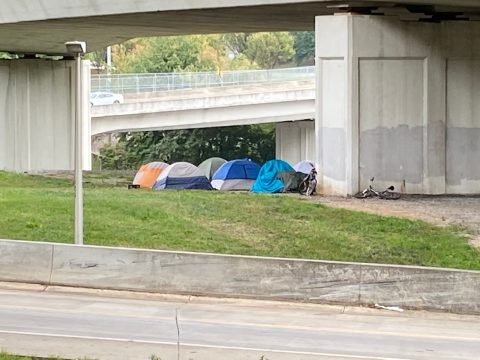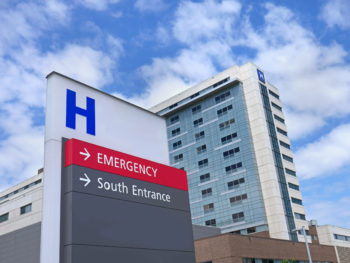By Kathryn Lawler, Tom Andrews and Shannon Sale
A patient at an Atlanta clinic regularly attended doctor’s appointments to monitor his diabetes, but he didn’t see any improvement. In fact, sometimes his A1c score was higher than on his previous visit.
Given the way health care problems are often addressed, a provider would almost immediately begin to look at this patient’s diet, exercise and other lifestyle habits as the likely contributors to his lack of medical progress. However, in this case, the problem was linked to something more complicated.

Recently, a community health worker discovered that the man was living in a storage unit — a place without heat, air conditioning or running water. Though he was holding down a full-time job, he had to call in sick frequently because of his unmanaged diabetes, and he had even been hospitalized several times over the past year.
Stories like this are a stark reminder that housing and health care are intrinsically linked.
As we start to imagine a new way of caring for and supporting Georgians on the other side of this pandemic, we have an unprecedented opportunity to invert the burden and put people at the center of the system of care. The intersection of health and housing is a critical place to start.
Poor quality housing can make people sick. Asthma attacks that send a child repeatedly to the ER are often the result of mold or pests in the child’s home. Concerns about rising rents, utility bills or potential evictions affect mental health and cause stress that can exacerbate chronic conditions like diabetes, heart disease or hypertension.

An individual may receive state-of-the-art medical care, performed by highly trained nurses and surgeons, but still get worse rather than better without a safe living space where rest and recovery can take place. Finally, more and more metro Atlanta health systems have patients who do not need hospital care but remain in hospital beds for weeks and sometimes months, simply because there is no respite or transitional care available. At a time when our region needs every available bed, this is hard to comprehend.
News about the on-again, off-again eviction moratorium, alongside rising rental and housing prices across metro Atlanta, has elevated housing to the top of many conversations. However, this challenge is not new. Housing has been identified as a priority concern for patients of many health systems in metro Atlanta in the last two cycles of Community Health Needs Assessments. As most health systems begin or complete their next cycle in the coming months, no one doubts that housing will top the list again.
The Atlanta Regional Collaborative for Health Improvement (ARCHI) has been at the forefront of bringing together the right people and organizations to address complex issues that affect a cross-section of the community. We have developed a framework that inverts the burden by eliminating inefficient and ineffective processes to meet people where they are and deliver the integrated care that will help them heal and keep them well. For us, housing and health go hand-in-hand.
Moving the needle on persistently poor health outcomes and increasing racial disparities will come when we all — public, private and nonprofit partners — change the way we work together.
In December 2019, even before it was clear that the world was on the brink of a global pandemic, ARCHI brought together CareSource, Grady Health System, Kaiser Permanente, Piedmont Healthcare, St. Joseph’s Health System/Mercy Care and WellStar Health System. This group of partners signed a commitment to collectively address affordable housing.

This group has studied how health systems across the country are making direct investments in affordable housing projects while partnering and sharing resources to make housing available for their patients and their employees. These Atlanta leaders have made contributions to organizations providing critical housing support throughout the pandemic. Recently Grady Health System hired a full-time housing navigator to assist patients. Saint Joseph’s/Mercy Care will break ground on a 170-unit affordable housing development across the street from a MARTA train-and-bus station, and the housing will have specific units set aside for those who need to recover from medical treatment.
We know we can improve health when we work collaboratively to address root causes. When we reach across sectors to focus on a person’s comprehensive needs, we move from delivering services, which so many Atlanta partners do well, to creating impact.
This is how we recover from this pandemic — collectively building a system that will deliver well-being for all.
Kathryn Lawler is executive director of ARCHI, a growing coalition of public, private and nonprofit organizations committed to improving the region’s health. Tom Andrews, a founding member of ARCHI, is CEO of Saint Joseph’s Health System/Mercy Care, a federally qualified health center and Atlanta’s only health care for the homeless program. Shannon Sale, a founding member of ARCHI, is chief strategy officer of Grady Health System, one of the largest safety-net health systems in the U.S., providing care at Grady Hospital and through six facilities inside and outside of the Perimeter.

